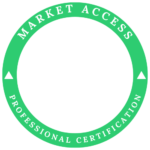Academy Of Pharmaceutical Affairs
Market Access Professional Certification GCC

Be ready for KAM Assessment and confidently step into a KAM or Market Access role
Designed for Product Specialists and Medical Representatives
Next Cohort Starts
August 2025
Start Your Learning Journey
Your learning journey is extended beyond the course duration
Be ready for KAM assessment
"Engage in live interactive online sessions led by Market Access expert Dr. Sherif Hammad. Master critical topics from healthcare landscape to pricing strategies."
"Experience three personalized mock assessments designed to pinpoint strengths and improvement areas with clear, individualized feedback."
"Benefit from six months of continuous development, including monthly sessions focused on soft skills, communication, and interview readiness."
MAPC
Detailed Content
By the end of the program you will be able to:
Module 1: Healthcare Market Landscape and Introduction to Market Access
Health as a Good
The Goal of Healthcare
Healthcare Market Specifics
Healthcare as a Mixed and Collective Good
Equity in Health and Healthcare
The Goal of Healthcare (emphasizing purpose and outcomes)
Detailed Analysis of Healthcare Market Specifics
Exploration of Healthcare as a Mixed and Collective Good
Equity: Health and Healthcare Access
Module 2: Pharmaceutical Market Access Strategy
Public Health Definition
Decision Making in Public Health
Organization of Public Health
Funding Health Care and Public Health
Criteria for Priority Setting and Decision Making
Health Inequalities
Monitoring and Evaluation of Public Health Policies
Reimbursement Decision Making
Methods for Incorporating Societal Preferences into Decision Making
Defining Key Concepts
Relevant Theories and Methods in Healthcare
Module 3: Key Accounts Management
Introduction to Key Accounts
Definitions of Key Accounts
Objectives and Values of Key Accounts
Types of Key Accounts
Benefits and Challenges of Key Accounts
Key Account Process
Developing a Key Account Plan
Customer Relationship Management (CRM)
Implementation of the Key Accounts Management Plan
Module 4: Pharmaceutical Marketing and Product Life Cycle Management
The role of marketing in health care organizations
Defining the health care system and its trade-offs
How health care buyers make choices
Market segmentation, targeting, positioning, and competition
The nature of services
Viewing the marketing mix
Managing product lifecycle
Building the brand
Managing the stages of the product life cycle
Marketing channels and value networks
Module 5: Pharmaceutical Pricing
Introduction to Pricing
Pricing Techniques
Reference Pricing Systems in Various Markets
Case Discussion
Module 6: Negotiation Skills
Negotiation Strategy and Principles
Types of Negotiation Techniques (ZOPA, BATNA, SPIN)
Negotiating via Emails and Calls
Negotiation in Market Access
Module 7: Introduction to Health Economics
Pharmacoeconomic—what is it?
Why is pharmacoeconomic important?
Relationship of pharmacoeconomic to other research
Types of pharmacoeconomic studies
Measuring and estimating costs
Health-related quality of life measures versus utility measures
Questions to use when critiquing research articles





